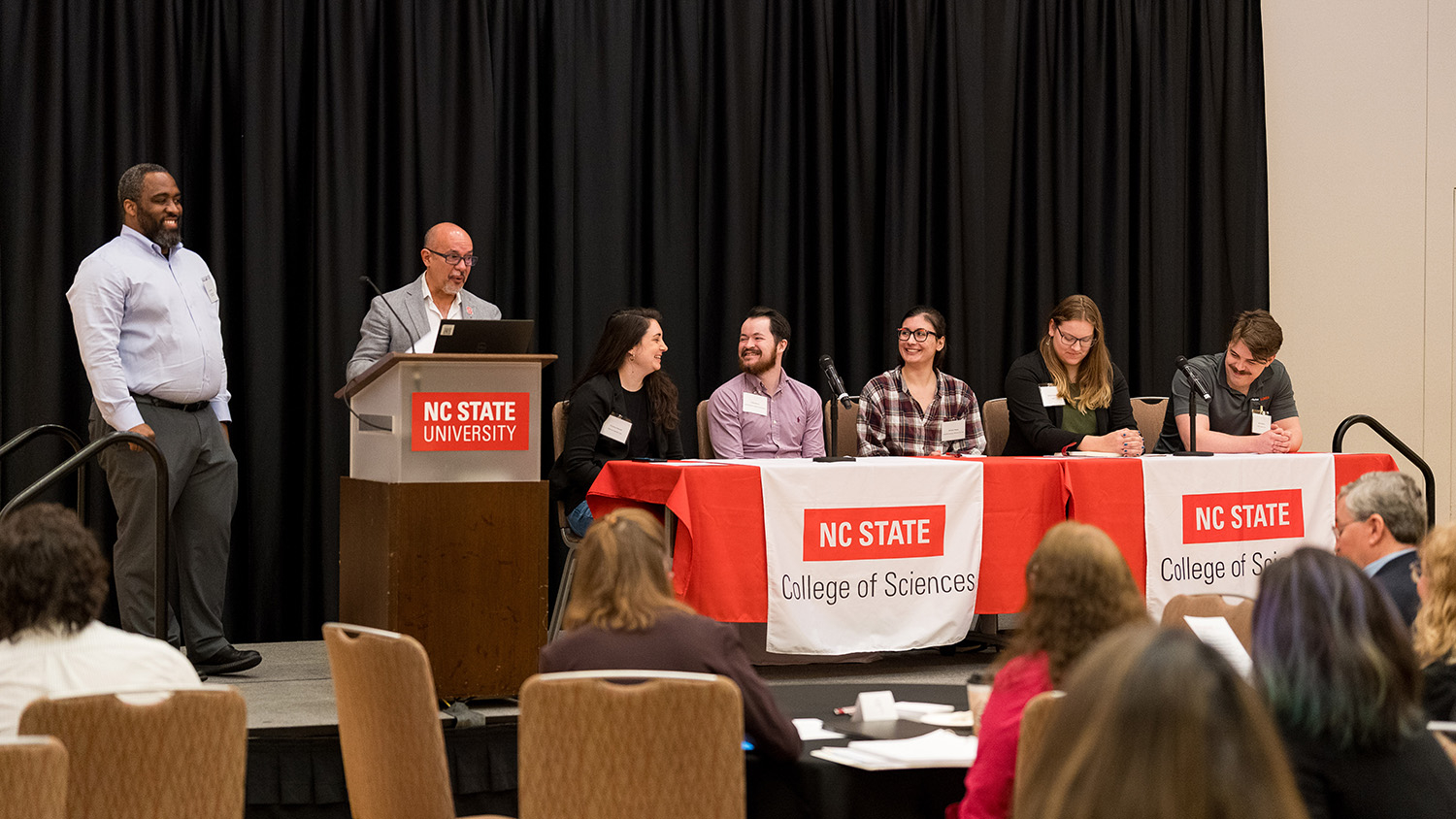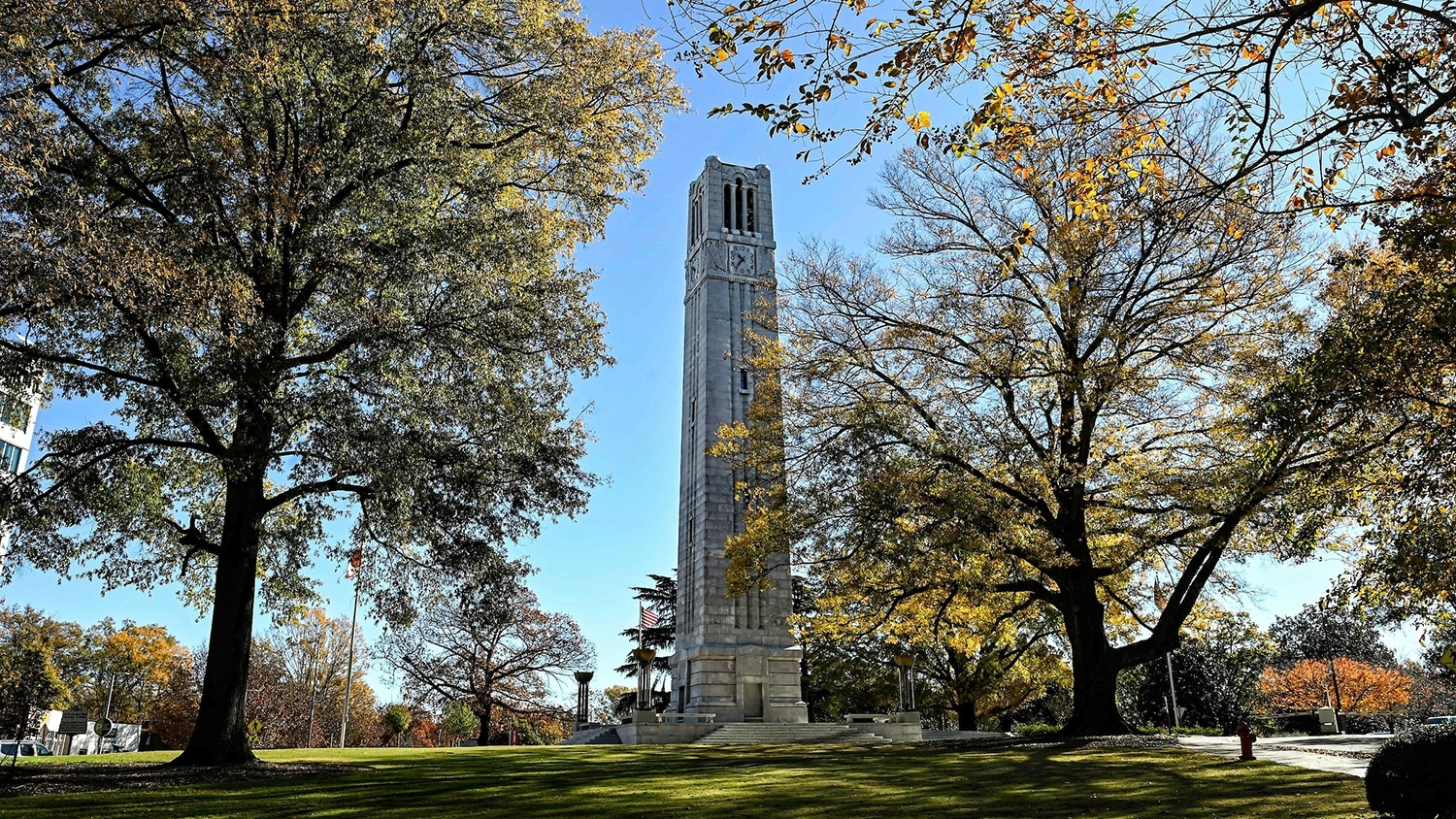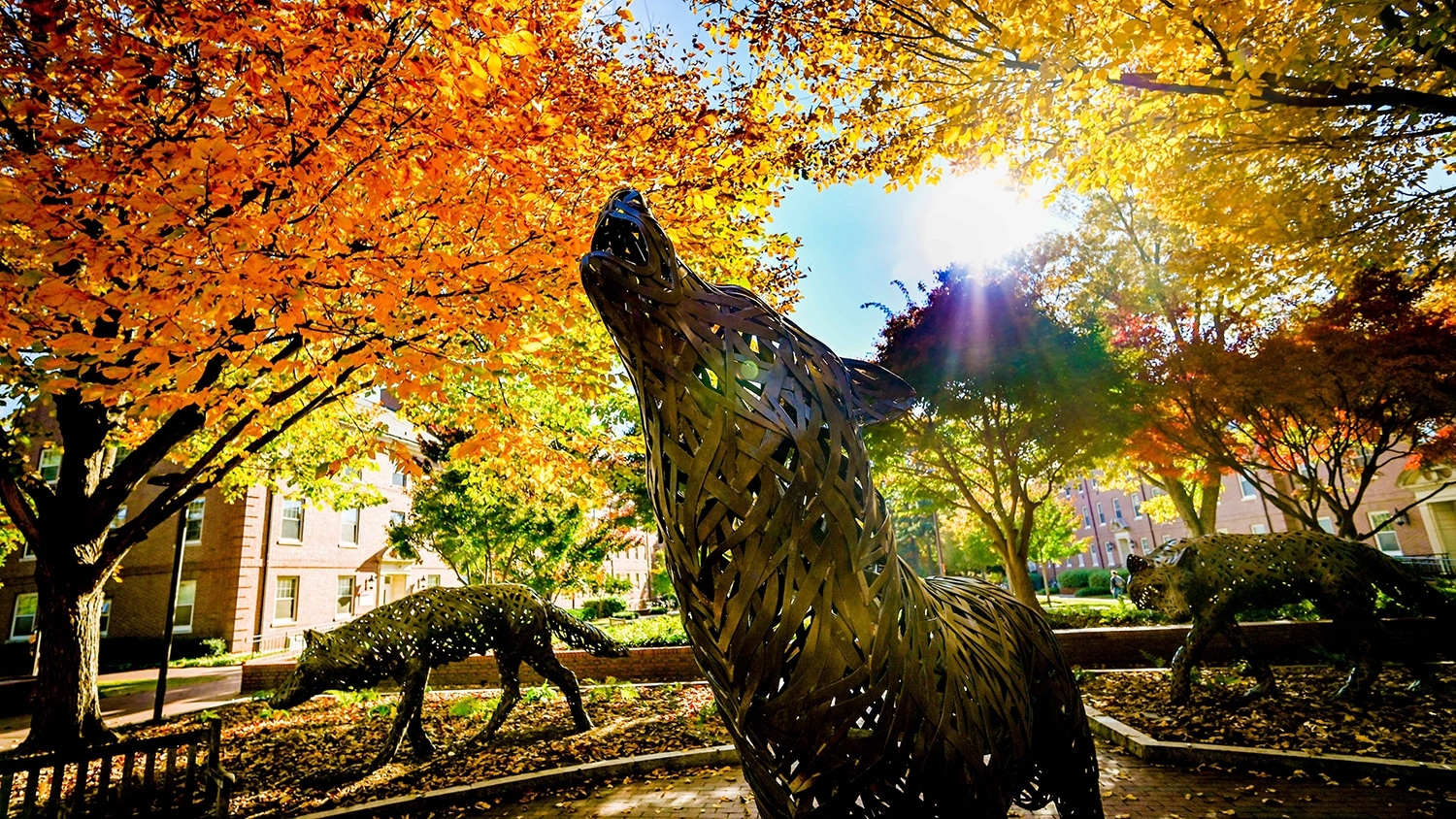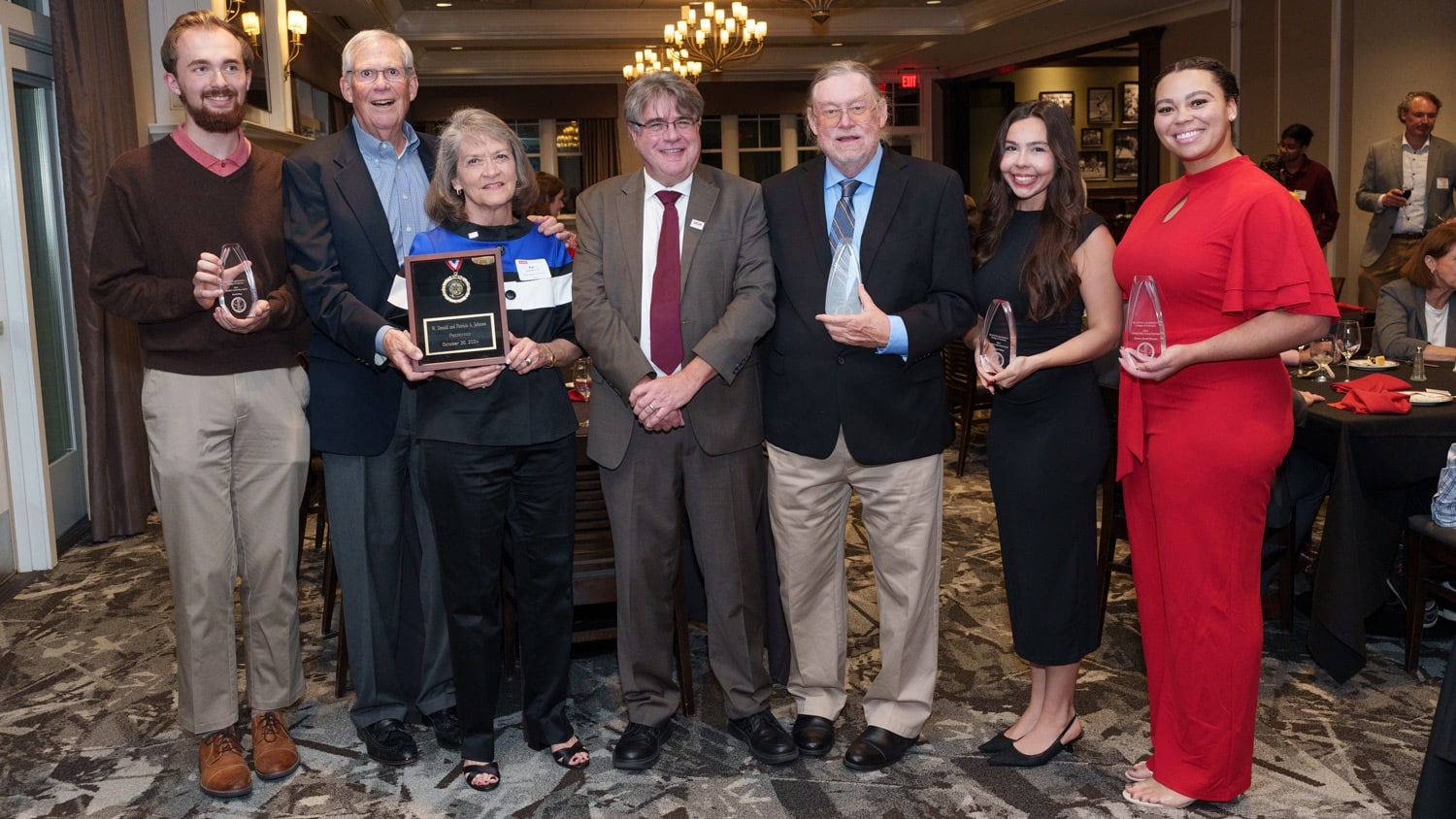ChemEd Summit Envisions Interdisciplinary Future for Chemistry Students

Transforming undergraduate chemical sciences education for the next-generation workforce took a step forward at NC State during the recent ChemEd Summit.
On March 8, the Integrative Sciences Initiative (ISI), in partnership with the Departments of Chemistry and Molecular and Structural Biochemistry and under the auspices of the College of Sciences Dean’s Faculty Fellow Program, hosted the one-day event that brought together members from the industrial, academic and state and federal chemical sciences communities.
The idea for the ChemEd summit emerged from current efforts by Ghada Rabah, a teaching professor in the Department of Chemistry, to recruit industry participation in course-based undergraduate research projects in the upper-level Measurement Techniques lab that she co-teaches. Her recent appointment as College of Sciences Dean Faculty Fellow offered her the platform and the time to broaden those efforts and organize the ChemEd Summit aimed at exploring potential industry engagements in chemical sciences education.
Jeremiah Feducia, director of undergraduate programs for the ISI, offered the following perspective, “We want the ChemEd Summit to start important conversations across disciplines to help break down existing siloes in science disciplines.This summit is a perfect example of how NC State is connecting campus and industry partners to make it easier for students and faculty to engage in an interdisciplinary approach to education and training.”
Organizers set forth the following goals for the event, in order to form a foundation for moving forward in educational advancement:
- Identify the essential knowledge, skills and abilities (KSAs) required for the evolving landscape of the chemical/molecular sciences;
- Collaboratively develop a shared vision for the future of chemical/molecular sciences education, considering the evolving needs and challenges in the field; and
- Outline practical steps that can be taken and initiatives that can be implemented to realize a shared vision for advancing chemical sciences education in collaboration with the broader campus and industrial communities.
“The field of chemistry is experiencing significant advancements — the growing importance of interdisciplinary research, the integration of artificial intelligence (AI) and an increasing emphasis on sustainability,” said Rabah. “The undergraduate chemical sciences curricula must evolve. We must ensure that students are well-prepared to meet the demands of the new market. That’s the kind of work we were engaging in at the ChemEd Summit.”
Attendees learned about chemical sciences education and its relation to chemistry-rich fields through several panel discussions, which included:
- Student Perspectives on Transitioning to the Workforce – Recent graduates from NC State’s Departments of Chemistry and Molecular and Structural Biochemistry shared their experiences on joining the workforce.
- Current Landscape of Chemistry as a Profession – Panelists from industry and government sectors shared their perspectives on the current state of the chemical sciences profession, focusing on expectations of current employees and where the profession is headed in the future.
- Current Landscape of Chemical Sciences Education – Panelists from diverse backgrounds shared their perspectives on the current state of chemical sciences education and how institutions can adapt to better prepare students for future careers in the chemical sciences.
Michelle Brooks, assistant director of the Office of Higher Education at the American Chemical Society, noted “I would love to have one of these [summits] at a regional or a national level, and really have that conversation in a broader way. This is an excellent model for how to do it really, really well. So I appreciate the invitation to be part of the panel and to be here today to listen to what is happening in this area.”
During the Current Landscape of Chemical Sciences Education panel, panelists discussed how current curricula align with industry needs and where there are gaps, and the ways interdisciplinary programs prepare students for careers in the chemical sciences field.
Panelist James MacCord, a chemist with the U.S. Environmental Protection Agency, noted that “there is value in teaching people how to learn. The most serviceable skills you can gain in your education are being able to use a variety of ‘tools’ from your toolbox, and approaching things open-endedly. Being able to communicate in an appealing manner is incredibly important. People need to have an understanding of the why behind what they’re doing and how it impacts others. You have to be able to adapt, and learn how to learn.”
Looking Toward the Future
Event organizers utilized morning panel discussions and the results of a pre-summit survey to identify critical knowledge, skills and abilities for students’ success and to outline practical steps and strategies towards creating a shared vision for the future of chemical sciences education among attendees.
“NC State is at the forefront of efforts to transform teaching, research and discovery in chemistry and other STEM fields through the ISI and through other transformative initiatives,” said Feducia. “With the advent of the ISI, construction of the Integrative Sciences Building and being at the forefront of a growing national interest in interdisciplinarity, the university is well-positioned to lead the effort to develop educational models and identify curricular changes that ensure students are well-prepared post-graduation.”
The Importance of Interdisciplinarity
Students interested in chemistry and life sciences often encounter introductory coursework in the molecular sciences in an isolated manner. Many lecture courses lack significant interdisciplinary thinking, and foundational lab courses are not designed to develop cross-disciplinary skills like data analysis, experimental design and communication skills.
“Shifting away from these approaches will prepare students to engage in team science with students from multiple disciplines, working together to solve today’s grand challenges,” said Feducia. “Additionally, introductory STEM courses have been shown to serve as gatekeeping ‘weed-out’ courses, with a disproportionate impact on students from marginalized groups. An approach focused on integrating interdisciplinarity and active learning into classes and labs will benefit all students as they transition into the workforce of tomorrow.”
Due in part to NC State’s embrace of interdisciplinarity, and efforts of universities across the country, there is a greater push to create curricula that are focused on teaching students how to think critically about chemical problems, as opposed to introducing and attempting to develop large amounts of chemistry content.
AI and automation are also at a stage of development where these concepts can be introduced early in a student’s academic career. Faculty already use these tools and skills in their research, making the potential transition to the classroom more of a possibility, which will help prepare students to enter a workforce where they will be expected to be competent in AI and automation in order to be successful.
“Students are graduating into a market where there is an increasing expectation for them to tackle scientific challenges that demand interdisciplinary approaches,” said Rabah. “Providing them with opportunities to collaborate with researchers from other disciplines to solve problems and answer research questions can enhance their enthusiasm for their STEM education and alter their mindsets about what their field and other different fields have to offer.”
Alun Lloyd, associate dean for academic affairs in the College of Sciences, echoed Rabah’s sentiments on chemistry education and the workforce. “The College of Sciences is at the forefront of preparing students for the workplaces of the twenty-first century,” he said “We are very excited to support Ghada’s initiative through her dean faculty fellow appointment to strengthen NC State’s education in the chemical sciences. By building connections across campus departments and initiatives, and bringing insights from industry employers to the classroom, this effort will lead to a more impactful education for students for years to come.”
This post was originally published in Provost's Office News.
- Categories:


